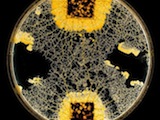seminar – Tuesday 18th December 2018
 Habituation in non neural organisms, evidence from slime molds
Habituation in non neural organisms, evidence from slime molds
Dr Audrey Dussutour, Centre de Recherches sur la Cognition Animale, Université Toulouse III
Amphitheatre Monge, 4PM
Learning, defined as a change in behavior evoked by experience, has hitherto been investigated almost exclusively in multicellular neural organisms. Evidence for learning in non-neural multicellular organisms is scant and only a few unequivocal reports of learning have been described in single celled organisms. In this conference, in a first part, I will attempt to demonstrate habituation, a simple form of learning, in a unicellular organism Physarum polycephalum. In a second part of this conference, I will show that habituation can be transferred from one cell to another via cell fusion. In a last part, I will present a potential mechanism responsible for habituation in slime molds. All these results suggest that slime moulds may be an ideal model system in which to investigate fundamental mechanisms underlying the ground-floor of learning abilities. Besides, documenting habituation in non-neural organisms such as slime moulds is centrally important to a comprehensive, phylogenetic understanding of when and where in the tree of life the earliest manifestations of habituation evolved.
- kc_data:
- a:8:{i:0;s:0:"";s:4:"mode";s:0:"";s:3:"css";s:0:"";s:9:"max_width";s:0:"";s:7:"classes";s:0:"";s:9:"thumbnail";s:0:"";s:9:"collapsed";s:0:"";s:9:"optimized";s:0:"";}
- kc_raw_content:
 Habituation in non neural organisms, evidence from slime molds
Habituation in non neural organisms, evidence from slime moldsDr Audrey Dussutour, Centre de Recherches sur la Cognition Animale, Université Toulouse III
Amphitheatre Monge, 4PM
Learning, defined as a change in behavior evoked by experience, has hitherto been investigated almost exclusively in multicellular neural organisms. Evidence for learning in non-neural multicellular organisms is scant and only a few unequivocal reports of learning have been described in single celled organisms. In this conference, in a first part, I will attempt to demonstrate habituation, a simple form of learning, in a unicellular organism Physarum polycephalum. In a second part of this conference, I will show that habituation can be transferred from one cell to another via cell fusion. In a last part, I will present a potential mechanism responsible for habituation in slime molds. All these results suggest that slime moulds may be an ideal model system in which to investigate fundamental mechanisms underlying the ground-floor of learning abilities. Besides, documenting habituation in non-neural organisms such as slime moulds is centrally important to a comprehensive, phylogenetic understanding of when and where in the tree of life the earliest manifestations of habituation evolved.
